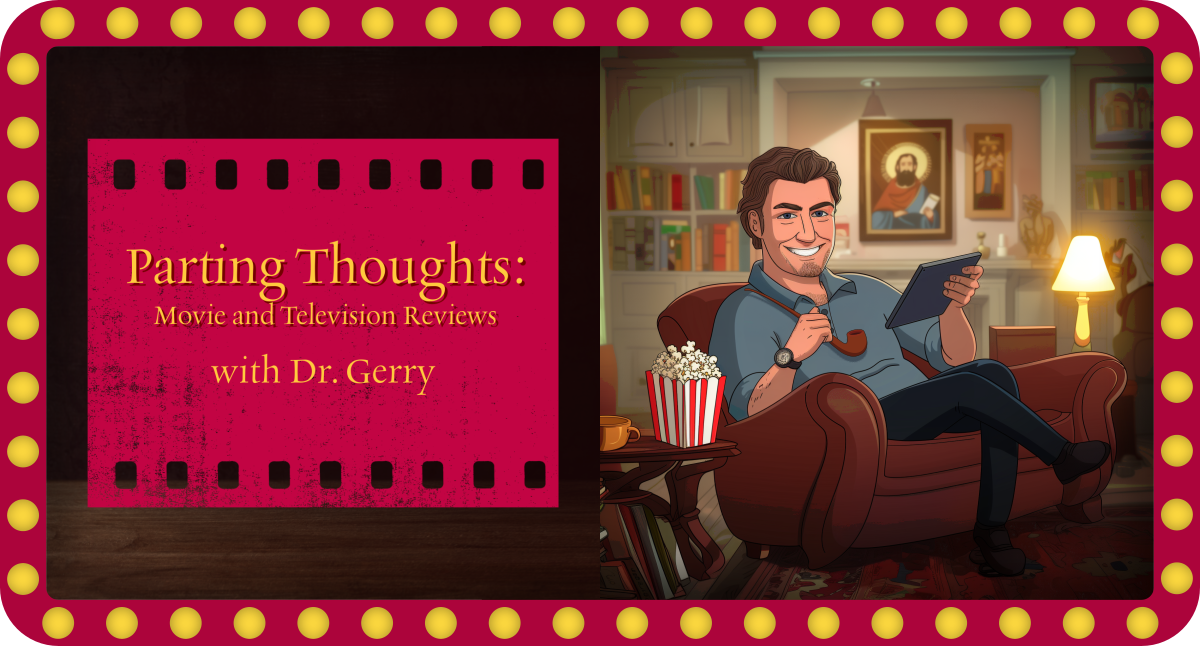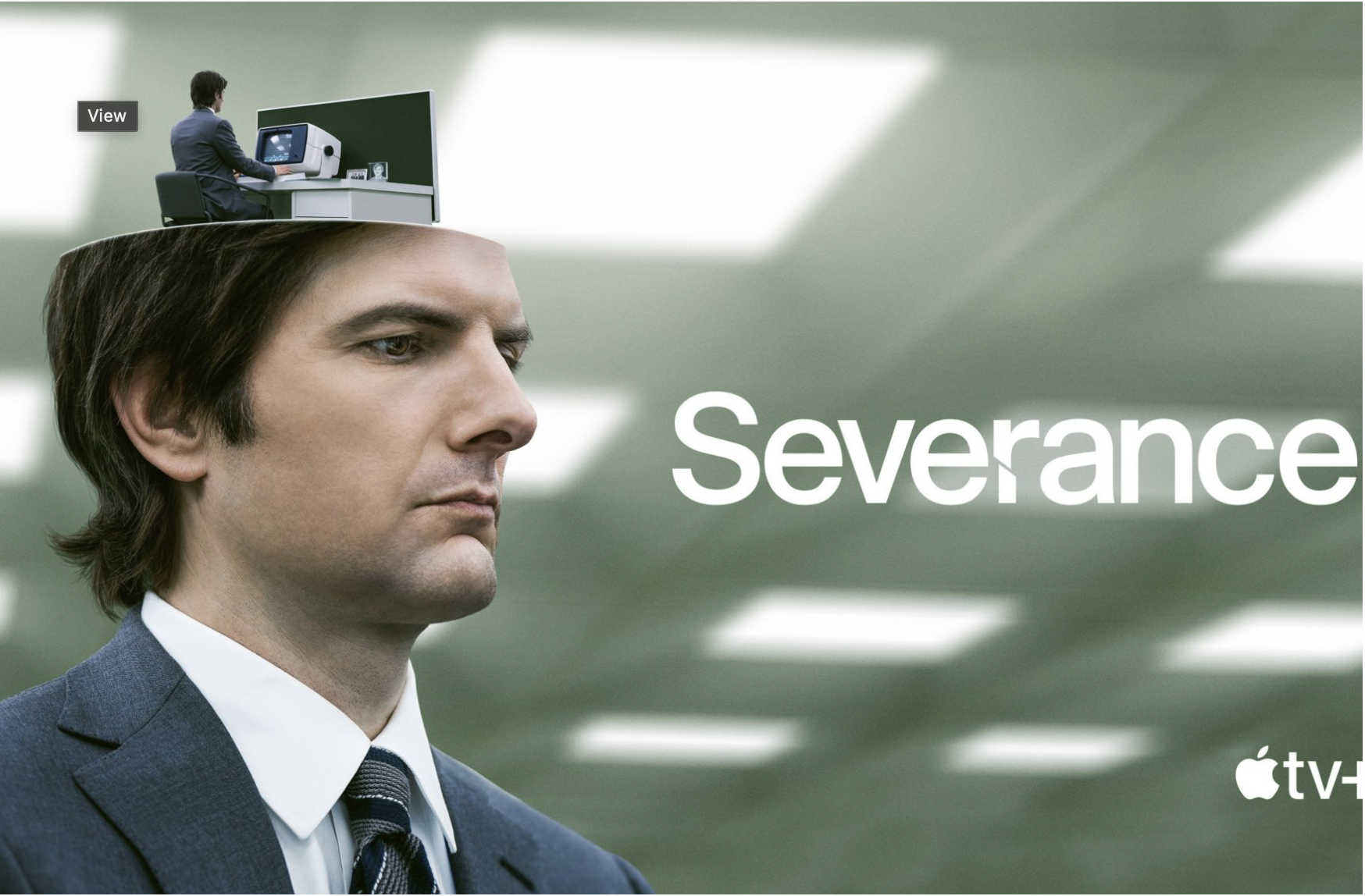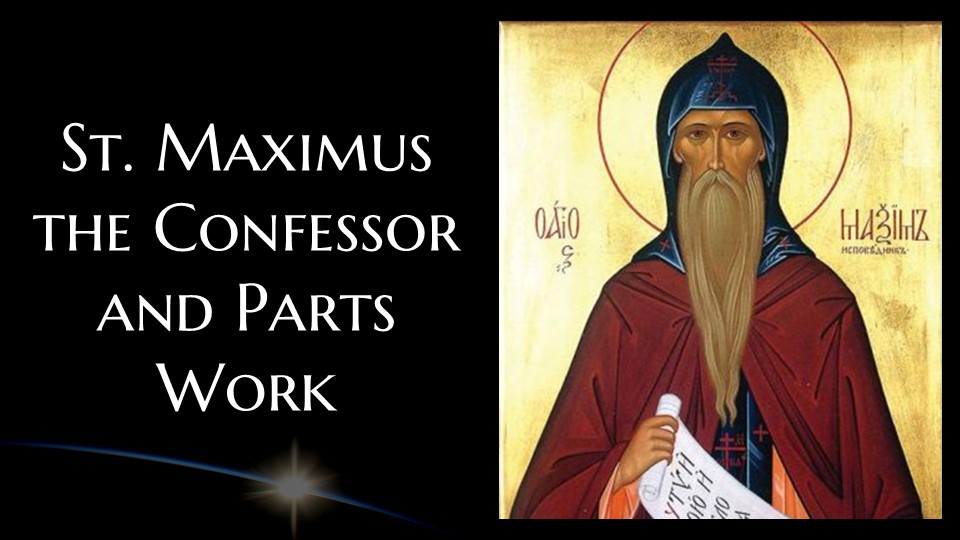Imagine that you could send a part of yourself to work every day while you, or the rest of you, remained blissfully unaware of the daily grind. This is what Lumon Industries promises its employees in the Apple TV psychological drama Severance.
The main protagonist Mark Scout, played by Adam Scott, chooses to undergo a medical procedure where he is “severed” – a chip is implanted in his brain that creates a separate identity, called an “innie,” that is activated every day when he steps into the office elevator. The innie has no knowledge of his life history or circumstances.
At the end of the workday, Mark’s “primary” identity, referred to as his “outie,” is activated and exits the office elevator with no knowledge of what has gone on at work. In summary, innies and outies share the same body but are unaware of each other’s experiences.
My friends, this is the ultimate in compartmentalization!
As it goes with any dystopian science fiction story, everything is not as it seems. The work being done by Lumon Industries involves experiments and activities that are strange and inscrutable.
Harmony, the floor manager played to a chilling and frightful perfection by Patricia Arquette, is severe and oddly inhuman; she also turns out to be Mark’s outie’s real-life next-door neighbor — truly no part of his life is left unobserved.
One innie on Mark’s floor finds a way to escape, tries to be un-severed, and ultimately perishes. Another innie, Helly, played by Britt Lower, hates her life at work so much she tries to appeal to her outie to save her, and when she is rebuked by her own counterpart, “you are not a person,” she attempts suicide.
In Severance we have a situation where people are choosing to enslave a part of themselves because they do not believe in the dignity of work itself. Work is seen as nothing but a burden.
The innies do not even understand the point of the work that they are doing; they are simply ordered to comply which in turn devalues their very humanity. They are also expected to show unwavering support and loyalty for their employer, Lumon Industries, as well as religious devotion to its founder, Kier Eagan.
There is an eerie attempt here to parallel devotion to work with religious devotion. Lumon has all the qualities of a religious cult: charismatic leader, the demand for unquestioned loyalty, keeping innies in the dark about the company’s real purpose, and unaccountable and authoritarian leadership.
The innies are essentially held hostage but made to believe it is for their own good and for the good of their outie.
Severance and parts work
Severance powerfully illustrates the multiplicity of the mind with its portrayal of an innie part (work life) and an outie part (personal life) in each human person. These two “parts” once severed do not share memories or consciousness. In many ways this mirrors how trauma survivors often unconsciously compartmentalize parts of their lives to avoid pain.
How can we understand, from an IFS perspective, the decision made by several of the characters to undergo the severance procedure and exile a part of themselves? Perhaps a protector part of the outie exiles the innie to protect the system from some inner pain.
Mark chooses severance as a way to cope with grief. Dylan chooses it to manage his shame and provide for his family. Helly does it to protect her family’s public image. Just like our own protector parts, they all have intentions motivated by a perceived good.
The severed characters have chosen to exile one or more of their manager parts. The managers (i.e. the innies) become exiles destined to live forever in a hellish world of unending tedious and meaningless office work.
The work is completely disconnected from the larger self-system (the outie) with no sense of history, family, or life purpose. The system has abdicated its self-leadership of the innie to the corporation.
As a side note, I would make the case that Severance is really the story of how some people sold a part of their soul to the devil, and how those same people seek redemption through re-integration. Like in Plato’s cave analogy, the innies realize that they are enslaved and see the world only in shadows. This is their difficult and painful journey out of the cave.
As the innies gain a deeper understanding of their plight, they yearn for integration. They seek to understand better the true nature of their work environment and they become suspicious and then disillusioned. They look for ways to connect with their outie and learn about their outie’s life.
Interestingly, as Mark’s innie strives for answers; Mark’s outie has a parallel process where he also begins to doubt the motives of Lumon. He questions his decision to be severed. Eventually Mark’s outie begins to demonstrate self-leadership as he seeks reintegration or “unsevering.”
As of yet there is no clear evidence of an IFS-type separate “Self” with qualities such as compassion, clarity, calm, and connectedness in Severance. One could make the case, perhaps, that the innies demonstrate more Self-like characteristics than their outies.
The innies are parts of self without any baggage from the past. In general, they have a child-like nature. One could argue that they represent the “true” unadulterated personality of the person unaffected by their histories.
We do see various innies bond with each other and even find love. They even sacrifice for each other as they work together to find answers and escape.
Reflections about our attitudes toward work
As with any good science fiction, the point is to challenge conventional thinking and appeal to our conscience. Severance challenges us to question ourselves and our relationship to work.
How do we feel about the work we do?
How many of us love the work we do?
How many of us count down the minutes before we can go home?
How many of us live for the weekend?
Many of us jump through hoops to impress our boss to get a promotion and a wage increase. We compete with others to be seen as more successful, more professional, and more valuable than others.
We sacrifice family, health, and sanity to finish a project on time or satisfy a major client. We depend on our company for wages and benefits.
In Severance, when the character Harmony is fired, she rages but she does not lose her cult-like loyalty to the company founder or the perceived mission of Lumon. How many of us “worship” the company or the work we do?
Dylan played by Zach Cherry learns that his outie has been unsuccessful for years in finding and maintaining a job. For him severance was a means to reclaim a shred of dignity and support his family. How many of us find our worth solely in the work we do?
How many of us bury ourselves in work to avoid other kinds of pain such as grief? How many of us escape life through work?
Perhaps in our own way, and not quite as drastically as in Severance, we are willing to banish parts of ourselves to “hell” in order to avoid real life. We may dissociate from anything which becomes intolerable such as pain, boredom, shame, fear, and any physical or relational challenges. Why not also do this with work?
And so perhaps the wild notion presented in Severance is not actually so unbelievable. Perhaps we feel we have sacrificed too much for work. We start to strive for a post-work society, a virtual reality life that is curated and entertaining, a place where leisure is so much a part of life it cannot be differentiated from itself – a true life of leisure.
And what would then become of work? Would it become a thing of the past left to automation and AI? And if so, would we lose all motivation if our own survival and self-worth was not in any way at stake? Would we descend into a kind of wasteful limbo, become lost boys, turn into donkeys?
Alternatively, and much less cynically, would man be free to pursue real fulfilment? In the future idealistic world of Star Trek, at least in the Federation, there is no money, no poverty, and no disease.
Everyone’s basic needs are met, and people choose careers based on their talents and because it is an honor to serve. Is this even remotely possible? If we never had to do anything tedious, if our basic living needs were always met, would we naturally strive for something greater? Would we pray more, spend more quality time with our loved ones, and engage in more creative and meaningful projects? Would we achieve Saint Thomas More’s Utopia? A return to Eden? A Kingdom of Heaven on Earth?
Saint John Paul II, work, and the integrity of the human person
In 1981’s Laborem Exercens (Human Work) Pope Saint John Paul II, the Witness to Hope, would have us pause and consider the following: “Work is a good thing for man-a good thing for his humanity-because through work man not only transforms nature, adapting it to his own needs, but he also achieves fulfilment as a human being and indeed, in a sense, becomes ‘more a human being.’”
Is it wrong, unnatural even, to strive for a world where work was no longer necessary? Or is it simply in our very nature to “work” in some capacity, even if we don’t need to for survival, because work has the potential to bring meaning to our lives?
What we learn from the characters in Severance is that despite their attempt to avoid suffering through severance, the outies are not actually happier than their innies. It can never be acceptable or truly profitable in the long term to dehumanize a part of oneself for a perceived good.
True meaning in life can only happen with personal integration as well as a loving relationship with others and God. Instead of dissociating oneself from work, we need to sanctify and bring meaning to work.
According to Saint John Paul II, human work has an essential dignity because the worker is a human person. He warns us that technology has the potential to turn man into a slave, and he reminds us that “as a person, man is therefore the subject of work.”
Pope John Paul II, the Apostle of the Human Person, highlights the heart of Christian teaching on work as he says, “there is no doubt that human work has an ethical value of its own, which clearly and directly remains linked to the fact that the one who carries it out is a person, a conscious and free subject, that is to say a subject that decides about himself.”
Conclusion
Severance is a powerful and thought-provoking drama that stirs up questions about the meaning of work, the rights and identity of the worker, what is a healthy work-life balance, and what is the role of corporations in our lives.
The program speaks to the need for human connection and interior integration in order to find a true purpose in all aspects of our life, including work.
[Severance season 1 came out on Apple TV in February 2022 and season 2 became available in January 2025. It has been renewed for a third season.]
Dr. Gerry Crete is the author of Litanies of the Heart: Relieving Post-traumatic Stress and Calming Anxiety Through Healing Our Parts which is published by Sophia Institute Press. He is the founder of Transfiguration Counseling and Coaching, Transfiguration Life, and co-founder of Souls and Hearts.
###
Interior Integration for Catholics Episode 169 on St. Maximus and IFS
Question: Did St. Maximus anticipate Internal Family Systems thinking by 13 centuries?
Answer: In a word, Yes. Maximus, writing in the seventh century, described in detail the unity and distinctions within the human person, and how each of us is a mediator that connects the spiritual and natural realms, and microcosm that contains within us the entire cosmos. Mind-blowing ideas.
St. Maximus also believes that each of us is a macrocosm, being able to influence the whole world in ways that matter. Maximus was a sophisticated systems thinker. He believed we already have certain virtues within us that can and should be released to flower. And love was at the very center of his message. Join Dr. Gerry Crete, Dr. Christian Amalu, and Dr. Peter Malinoski as they explore Catholic parts work and St. Maximus to your imagination break free.
Check out the video here and the audio here for episode 169, or wherever you listen to podcasts.
Join Dr. Gerry, Dr. Peter, and Dr. Christian Amalu for a live episode of the IIC podcast
Be with us live for the recording of Interior Integration for Catholics podcast episode 172 Your Questions about Catholicism and Parts Work Answered, on the evening of Tuesday, August 5, 2025 from 8:00 PM to 9:30 PM Eastern Time. We will start with a brief drop-in experiential exercise, and then take your questions and have a panel discussion on the Catholic foundation for parts work approaches to flourishing, covering primarily episodes 166-170 of the IIC podcast on how a Catholic understanding of IFS and parts and systems thinking was prefigured by Scripture, the Early Church Fathers, St. Augustine, St. Maximus, and St. Bonaventure. Registration is free but required.
Three opportunities for Catholic formators
If you’re a Catholic therapist, priest, spiritual director, coach, or other formator, someone who professionally accompanies others in their personal formation, we have three special offerings just for you.
- A special retreat in Bloomington, Indiana, this August with Dr. Peter and Bridget Adams. Join us in person for our “Being At Service” retreat, which will be held at the Mother of the Redeemer Retreat Center August 11-14. We have finalized our sessions and schedule in this PDF brochure. Check out the informational video here. Register here.
- Fall 2025 Foundations Experiential Groups (FEGs). We are now accepting registrations for groups starting in late August or early September 2025. We have limited spots with a team of IFS-trained leaders on a variety of days and times. Check out all this information and officially register here.
- Fall 2025 Advanced Groups.If you have already completed an FEG or Stepping Stones, or are IFS Level One trained, you are eligible for one of our Advanced Groups this fall, including two groups led by Dr. Gerry Crete. One group will discuss his book Litanies of the Heart, and a second brand new group is called The Flourishing Heart. See all details here.
A Christian Approach to IFS: Integrating IFS techniques and concepts to increase our capacity for God’s love and grace.
The very first IFS-themed conference that Dr. Gerry and Dr. Peter attended was by Christian IFS therapist Julie Honeycutt, many years ago, at the start of their IFS journeys. Now Julie and her husband are offering a workshop for those who accompany others.
Join Orthodox Christians and IFS Therapists Julie and Dr. James Honeycutt (an Orthodox priest), in person in Lynchburg VA, or online for a 2-day workshop on August 22 and 23, 2025.
Together, we will explore the foundational principles of the IFS model of psychotherapy and how it interfaces with ancient Christian theology and practices.
This workshop is for:
- Licensed mental health providers
- IFS therapists and practitioners
- Ministry leaders and Pastors
- Trained Spiritual Directors
- Recent graduates
- Students of ministry or mental health
The Honeycutts will cover these themes
- What are parts? An overview of managers, exiles, and firefighters and how they work together | Genesis 3:7
- Decision-making committee | Grow in your ability to discern God’s voice over all the other voices inside
- Guided exercises | Get to know your parts | Ephesians 5: 12-14
- Levels of faith development and multiplicity | Common Christian Parts
- Navigating distracting parts that show up in your prayer life
- Self-improvement task force | Is the Holy Spirit guiding your growth?
- 4 fundamental IFS skills for spiritual formation and counseling | 2 Corinthians 10:5
- Praying for parts | Who inside is praying?
- Prayer warrior team | Is your inner fixer leading the parts of you that pray the most?
- Immanuel approach exercise: inviting broken and burdened parts to perceive God’s presence and grow toward trust | Luke 5:31
Each session will include time for participants to engage in experiential learning exercises that put these concepts into practice. Full Details Here
Just a note, this is not a Souls and Hearts sponsored event and the underlying anthropological base is not specifically Catholic, but we wanted to alert you, our Souls and Hearts subscribers to it in the event it is interesting to you.


